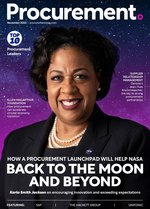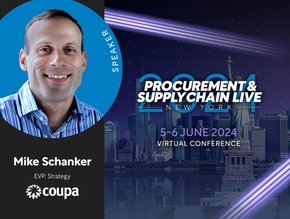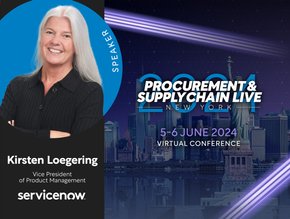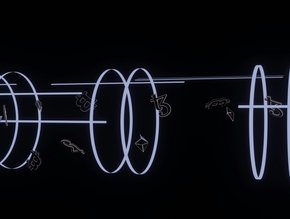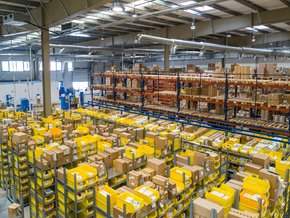Danone’s key to effective supplier relationship management

Having a systematic approach for evaluating the vendors that supply your organisation and getting the best from the relationship can be the difference in achieving wider business success.
For a multinational company like Danone, it is essential for its business growth in line with its ‘Renew Danone’ strategy and its wider sustainability agenda.
Chief Procurement Officer Jean-Yves Krummenacher says the key to its approach is simplicity. First, he says, the company secures the “basics of safety, quality and service levels”. “This allows us to nurture strong and transparent relationships to find the best solutions for efficiency, technology and sustainability,” he adds.
Benefits to customers
Krummenacher continues: “It all starts with our mission: bringing health, through foods to as many people as possible. The link to the end consumer is critical in everything we do.
“We cannot achieve our mission alone; we need our suppliers and partners. We have a track record of working in a collaborative way in everything from research and innovation to sourcing and sustainability. This approach remains at the core of our strategy for growth.”
The supplier relationships it has fostered allows Danone to achieve deeper collaboration in areas such as science, technology and sustainability. In science, for example, Danone has major assets around fermentation, and it combines these with the tech capabilities of its suppliers to create a competitive advantage.
In sustainability, meanwhile, Danone is a pioneer in packaging collection and recycling, and is leading the way on methane reduction. It also works with partners across its ecosystem in the construction of factories that work with recycled polyethylene terephthalate (rPET) – a plastic made from repurposed waste PET from businesses and consumers. It’s a material commonly used by manufacturers to help them meet sustainability goals.
Krummenacher explains this kind of long-term thinking is informed by the products we all see on supermarket shelves. “A good supplier relationship is the starting point for this process,” he explains, adding: “For more than a century we have been a science-based, consumer-centric company. Everything we do starts and ends with our customers, consumers and patients. This ensures we deliver the right products at the right time and that they are of superior quality. This is what they expect from us.”
Danone’s wider business goals
A key pillar of Danone’s supplier relationships strategy is its four-pillar ‘Partner For Growth initiative:
- Emerging science and technology
- Precision capacity creation
- Cost competitiveness
- Sustainability.
The initiative is designed to not only expand and strengthen existing global partner relationships but also forge new ones with start-ups, scale-ups, corporates and academic institutions.
“It is transforming the way we work with our partners, by strategically seizing opportunities based on consumer trends and insights to support mutual growth,” says Krummenacher. “It is a very ambitious and disciplined approach and is endorsed at the highest level at Danone, which makes a big difference. Each member of our executive committee is a sponsor of select partners, and this enables us to elevate partner relationships to board level.”
The strategy was further reinforced by a recent Partner for Growth event, which saw 50 select suppliers gather at the company’s Daniel Carasso International Research and Innovation Centre in Paris. The collective aim was to deliver even more for consumers, by creating healthier and more-sustainable products, without compromising on taste and texture.
Benefits to sustainability strategy
Krummenacher is emphatic on the importance of sustainability to Danone’s sourcing strategy. He says between 85-90% of its social and environmental impact sits within its supply chain, meaning embedding sustainability into its operations is essential.
“Sustainability sits at the heart of our sourcing strategy, and procurement is the driving force behind this,” he explains.
“At Danone, when it comes to sustainability, we act. We are proud of that. Here, again, the relationship with our suppliers is key. We partner with them in an open and transparent manner to achieve our sustainability goals.”
Key areas of Danone’s supplier relationship management include the tools it uses to improve traceability, and also its responsible sourcing programmes, which help influence tier 1 -suppliers.
“On Scope 1 and 2 emissions we will meet our science-based targets initiative,using traditional transactional ways of working with suppliers.
“On Scope 3, we need a much more collaborative approach. This is where our Partner For Growth program comes into play. It strategically leverages the power of our partner ecosystem.”
This package of measures is paying dividends, with Danone securing Triple A status from the Carbon Disclosure Project for a fourth year in a row. Danone ,is just one of just a dozen organisations to achieve this accolade.
To earn a triple-A score from CDP, organisations must show environmental leadership, and be meticulous and transparent about disclosing actions on climate change, deforestation or water security.
Managing suppliers of different sizes
Danone products are available in 120 countries, so simplicity of approach and supplier relationship KPIs are critical, says Jean-Yves Krummenacher:“Relationships work best when you have transparency on the intent and a clear picture of success.
“Key factors include a KPI scorecard, senior management involvement, and the agility to make quick decisions if the supplier relationship is not working”
The future of technology
As well as maintaining clarity and transparency in its supplier relationships, Krummenacher says emerging technologies also have a vital role to play. Of course, this begs the question whether AI can make significant improvements to sourcing at a company the size of Danone?
“Data is the starting point for supply security,” says Krummenacher. “Thanks to certain partnerships, we use AI for Tier 2 and 3 identifications. This really is a game changer in our ability to anticipate supply disruptions.”
This mastery of data is providing competitive advantage, with Danone recently using its partnerships to leverage AI to optimise decisions around ingredient- choice..
“I believe we have just scratched the surface of how AI can be used; the potential is immense.
“Some companies are embracing and investing in AI, but others are being too slow. Generative AI is already transforming procurement. It's up to us to transform it fast into a game changer for Danone.”
- What is Danone’s Global Strategic Partnerships Programme?Procurement Strategy
- Business networks: key to next level of supply collaborationSupply Chain Management
- The strategic benefits of supplier relationship managementProcurement Strategy
- Procurement & imports: the UFLPA and due diligence softwareSustainable Sourcing

